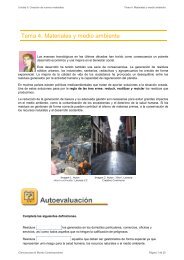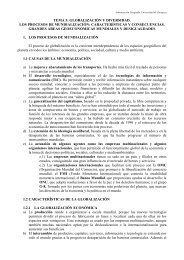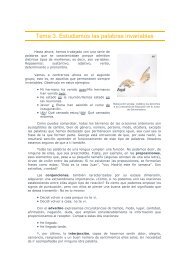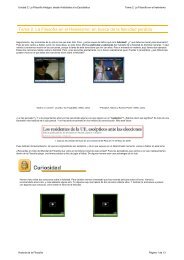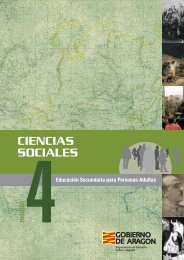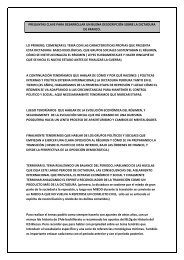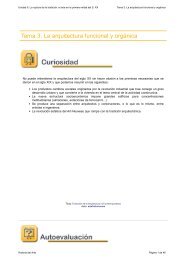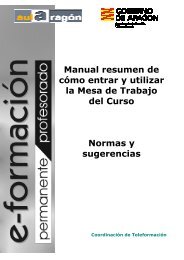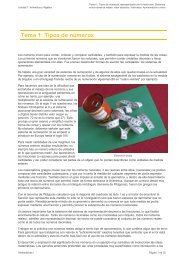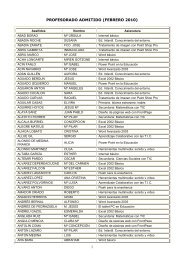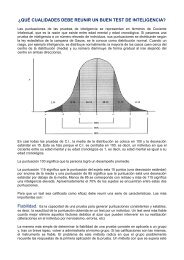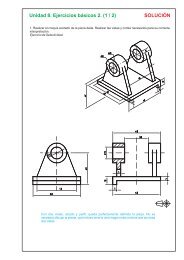- Page 3 and 4:
INGLÉS Educación Secundaria para
- Page 5 and 6:
INDICE Unit 1: Welcome back .......
- Page 7 and 8:
WELCOME BACK 1 HINTS TO THE UNIT En
- Page 9 and 10:
Unit 1: Welcome back Match the list
- Page 11 and 12:
Unit 1: Welcome back THERE IS/ARE -
- Page 13 and 14:
Unit 1: Welcome back Understand Rea
- Page 15 and 16:
Unit 1: Welcome back E) She can spe
- Page 17 and 18:
Unit 1: Welcome back - Location: in
- Page 19 and 20:
Unit 1: Welcome back Revise THE PRE
- Page 21 and 22:
Unit 1: Welcome back Fill in the ga
- Page 23 and 24:
Unit 1: Welcome back Fill in the ga
- Page 25 and 26:
Unit 1: Welcome back Writing Write
- Page 27 and 28:
Unit 1: Welcome back PHONETICS Engl
- Page 29 and 30:
Unit 1: Welcome back Match the list
- Page 31 and 32:
Unit 1: Welcome back Writing Make s
- Page 33 and 34:
Unit 1: Welcome back Writing Check
- Page 35 and 36:
Unit 1: Welcome back Read and write
- Page 37 and 38:
Unit 1: Welcome back POSSESSIVE ADJ
- Page 39 and 40:
Unit 1: Welcome back CAN - PODER /
- Page 41 and 42:
Unit 1: Welcome back • Para la te
- Page 43 and 44:
Unit 1: Welcome back VOCABULARY De
- Page 45 and 46:
Unit 1: Welcome back ACCESSORIES be
- Page 47 and 48:
Unit 1: Welcome back ADJECTIVES USE
- Page 49 and 50:
Unit 1: Welcome back BATHROOM Bath
- Page 51 and 52:
Unit 1: Welcome back SENDING TASKS
- Page 53 and 54:
LIFE EVENTS 2 HINTS TO THE UNIT En
- Page 55 and 56:
Unit 2: Life events True or false M
- Page 57 and 58:
Unit 2: Life events Practise the pa
- Page 59 and 60:
Unit 2: Life events Vocabulary In s
- Page 61 and 62:
Unit 2: Life events Listening 1. Li
- Page 63 and 64:
Unit 2: Life events Listening Scrip
- Page 65 and 66:
Unit 2: Life events B: PAST LIVES R
- Page 67 and 68:
Unit 2: Life events We form the neg
- Page 69 and 70:
Unit 2: Life events ● DATES ⇒ L
- Page 71 and 72:
Unit 2: Life events Listening SCRIP
- Page 73 and 74:
Unit 2: Life events Choose the righ
- Page 75 and 76:
Unit 2: Life events These past tens
- Page 77 and 78:
Unit 2: Life events Rewrite the sen
- Page 79 and 80:
Unit 2: Life events H) A lot of wat
- Page 81 and 82:
Unit 2: Life events Listening Liste
- Page 83 and 84:
Unit 2: Life events • En las form
- Page 85 and 86: Unit 2: Life events Formamos la neg
- Page 87 and 88: Unit 2: Life events RECUERDA: los a
- Page 89: Unit 2: Life events Use the table o
- Page 92 and 93: INGLÉS A: THE WORLD AROUND US LOS
- Page 94 and 95: INGLÉS Comparative form of adjecti
- Page 96 and 97: INGLÉS Choose the right option Cho
- Page 98 and 99: INGLÉS Writing 1. When did Edurne
- Page 100 and 101: INGLÉS Write Write sentences using
- Page 102 and 103: INGLÉS ● Activity: Give the supe
- Page 104 and 105: INGLÉS G) The Indian cobra is a ve
- Page 106 and 107: INGLÉS Understand Reading Read the
- Page 108 and 109: INGLÉS Listening SCRIPT THE GRAND
- Page 110 and 111: INGLÉS Practise now these lists of
- Page 112 and 113: INGLÉS • Write six true sentence
- Page 114 and 115: INGLÉS Reading MICHAEL JORDAN Mich
- Page 116 and 117: INGLÉS B) difficult tall thin pret
- Page 118 and 119: INGLÉS Choose the right option Lis
- Page 120 and 121: INGLÉS AS + ADJECTIVO + AS Susan i
- Page 122 and 123: INGLÉS good handsome happy heavy h
- Page 124 and 125: INGLÉS PREPOSITION OF MOVEMENT Up
- Page 127 and 128: NEW TECHNOLOGIES 4 HINTS TO THE UNI
- Page 129 and 130: Unit 4: New technologies Learn Lear
- Page 131 and 132: Unit 4: New technologies Look at th
- Page 133 and 134: Unit 4: New technologies Listening
- Page 135: Unit 4: New technologies Dear frien
- Page 139 and 140: Unit 4: New technologies Learn this
- Page 141 and 142: Unit 4: New technologies Elige las
- Page 143 and 144: Unit 4: New technologies Now, it is
- Page 145 and 146: Unit 4: New technologies Writing Fi
- Page 147 and 148: Unit 4: New technologies Choose the
- Page 149 and 150: Unit 4: New technologies Tense revi
- Page 151 and 152: Unit 4: New technologies Writing Wh
- Page 153 and 154: Unit 4: New technologies IMPORTANTE
- Page 155 and 156: Unit 4: New technologies VOCABULARY
- Page 157: Unit 4: New technologies SENDING TA
- Page 160 and 161: INGLÉS As for grammar, we will als
- Page 162 and 163: INGLÉS Writing Answer the question
- Page 164 and 165: INGLÉS Learn this vocabulary Can y
- Page 166 and 167: INGLÉS The world of television Loo
- Page 168 and 169: INGLÉS Writing 1. When does the an
- Page 170 and 171: INGLÉS Writing Now, answer these q
- Page 172 and 173: INGLÉS Write TELEVISION PROGRAMMES
- Page 174 and 175: INGLÉS Learn Indefinite Pronouns L
- Page 176 and 177: INGLÉS Revise the personal pronoun
- Page 178 and 179: INGLÉS Now try to match the type o
- Page 180 and 181: INGLÉS Understand Reading The birt
- Page 182 and 183: INGLÉS Until the Beatles,the music
- Page 184 and 185: INGLÉS Listening - Script Script A
- Page 186 and 187:
INGLÉS PHONETICS English consonant
- Page 188 and 189:
INGLÉS CONSOLIDATION Fill in the g
- Page 190 and 191:
INGLÉS Possessives and Pronouns Lo
- Page 192 and 193:
INGLÉS Choose the right option Com
- Page 194 and 195:
INGLÉS Match the lists Match the w
- Page 196 and 197:
INGLÉS GRAMMAR THE PAST CONTINUOUS
- Page 198 and 199:
INGLÉS POSSESSIVE PRONOUNS - PRONO
- Page 200 and 201:
INGLÉS TELEVISION Broadcast Channe
- Page 202 and 203:
INGLÉS SENDING TASKS BLOQUE: II IN
- Page 204 and 205:
INGLÉS A: FUTURE PREDICTIONS Can y
- Page 206 and 207:
INGLÉS The Simple Future Tense ●
- Page 208 and 209:
INGLÉS Match the lists Match the t
- Page 210 and 211:
INGLÉS Understand Reading A CITY O
- Page 212 and 213:
INGLÉS Writing Listen and fill in
- Page 214 and 215:
INGLÉS Write It is your turn now.
- Page 216 and 217:
INGLÉS Learn The future with Going
- Page 218 and 219:
INGLÉS Fill in the gaps to repair
- Page 220 and 221:
INGLÉS Travel and tourism Look at
- Page 222 and 223:
INGLÉS Match the lists Match these
- Page 224 and 225:
INGLÉS Do Do I'm going to have a v
- Page 226 and 227:
INGLÉS PHONETICS English consonant
- Page 228 and 229:
INGLÉS Vocabulary revision Elige l
- Page 230 and 231:
INGLÉS G) boarding gate motorcycle
- Page 232 and 233:
INGLÉS Going to revision Look at t
- Page 234 and 235:
INGLÉS Reading Jane Fred Jane¡ Fr
- Page 236 and 237:
INGLÉS 2.- Listen again and comple
- Page 238 and 239:
INGLÉS FIRST CONDITIONAL - PRIMERA
- Page 240 and 241:
INGLÉS VOCABULARY MEANS OF TRANSPO
- Page 242:
INGLÉS SENDING TASKS BLOQUE: II IN



